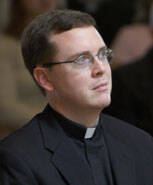On Ash Wednesday, as they have been doing for over 150 years, penitents sat scattered among the polished pews of St. Patrick’s Cathedral, each managing to have a private moment in one of the world’s most public places. As they waited for the red indicator lights to point the way to an open confessional, they were presumably engaged in what catechisms refer to as an “examination of conscience,” an unfortunately sterile moniker that makes the process sound like something akin to an MRI test. Nevertheless, the catechisms and the penitents are right. If one is serious about engaging in a good spiritual stocktaking, then one’s conscience is the best place to start.
That is because human experience confirms a fact that few, including the nonbelievers among us, would seriously wish to dispute: within every human heart there is a voice exhorting us to avoid evil and to choose what is right, what is good. As the late philosopher W. Norris Clarke, S.J., wrote, we hear this voice “as an absolute, unconditional moral imperative: ‘You ought to do this good. You ought to avoid this evil.’” In other words, it is a general, categorical, even primordial command.
But while most would agree that all of us have something like this voice within us, there is much disagreement about precisely where it comes from. St. Thomas Aquinas thought there were only three possibilities. The first is that this command is somehow my own creation. Thomas dispenses with this argument fairly quickly, however, arguing that I cannot be the source of this moral imperative because if I were, I could revoke it at any time. That arbitrariness just does not jibe with Thomas, because I experience this moral imperative as an abiding command, not as some moral standard I consciously chose one day. In other words, rather than being the product of my consciousness, it seems to impinge upon it, suggesting that it originates apart from me.
The second possible source for this moral command is corporate—it comes to me from my parents or from society. This is a view held by many moderns, who claim that much of morality is simply a social construct.
But if this were true, we could easily dismiss the command of conscience as soon as we discover its source: a flawed, possibly mistaken human authority. Yet human experience tells us that it just cannot be dismissed that easily. That is why people frequently refer to their conscience as “nagging.”
Thomas concludes that if the voice does not originate with me and is not the voice of the community, then it must be the voice of God. “Either moral obligation is an illusion,” Clarke writes, agreeing with Thomas, “foisted on me by the sheer power or persuasion of human society; or the ultimate source must be an absolute unconditional Law-giver.” This line of reasoning constitutes what is popularly known as the argument for the existence of God from the imperative of conscience.
Now if all this seems a little dry and too philosophical, then consider this: embedded within the argument, indeed within our consciences, is a pathway to a deeply åintimate, personal spirituality, not one through which we simply discover the rules by which we are to live (frankly, they are generally known to us already) but also one through which we discover the relationship through which we are to live. The imperative of conscience is God’s daring and generous offer to live among us in the most privileged and private parts of our lives. For in our consciences we discover who we are through a uniquely personal encounter with God’s spirit. We learn once again that God will not be outdone in generosity and that the penitents in the pews at St. Patrick’s that day were the luckiest people on Fifth Avenue.








